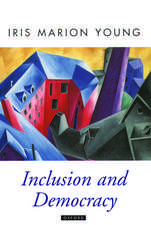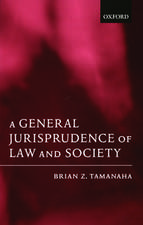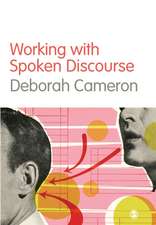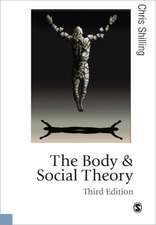Good to Talk?: Living and Working in a Communication Culture
Autor Deborah Cameronen Limba Engleză Paperback – 26 mar 2000
The book also poses questions about the social and political implications of talking about talking. Is `communication' the key to solving the problems of modern life? Are the lessons in talking that are offered to us now the ones we most urgently need to learn? Is it time to challenge the prevailing belief about what makes it good to talk?
Preț: 428.79 lei
Preț vechi: 504.46 lei
-15% Nou
Puncte Express: 643
Preț estimativ în valută:
82.05€ • 85.11$ • 68.42£
82.05€ • 85.11$ • 68.42£
Carte disponibilă
Livrare economică 06-20 martie
Preluare comenzi: 021 569.72.76
Specificații
ISBN-13: 9780761957713
ISBN-10: 0761957715
Pagini: 224
Ilustrații: black & white illustrations
Dimensiuni: 156 x 234 x 13 mm
Greutate: 0.34 kg
Ediția:First Edition
Editura: SAGE Publications
Colecția Sage Publications Ltd
Locul publicării:London, United Kingdom
ISBN-10: 0761957715
Pagini: 224
Ilustrații: black & white illustrations
Dimensiuni: 156 x 234 x 13 mm
Greutate: 0.34 kg
Ediția:First Edition
Editura: SAGE Publications
Colecția Sage Publications Ltd
Locul publicării:London, United Kingdom
Recenzii
`This is one of those books - in my view the best kind of academic work - which takes a very specific phenomenon, and shows it to be the key issues of much larger significance.... I found this book entertaining, moving, inspiring, infomative, and intellectually stimulating. It jas altered my ideas about applied linguistics, and about what happens in my daily life' - Applied Linguistics`Good to Talk demonstrates powerfully why it is increasingly not so good to talk. Deborah Cameron details how talk is increasingly "stylized", codified, standardized, and the subject of surveillance. Just as Michel Foucault demonstrated in the case of sex in the Victorian era, Cameron shows that there is entirely too much talk about talk' - George Ritzer, University of Maryland
`This is what an academic book should be: cool, well informed, and entertaining; a thought-provoking and dismaying study of how our everyday sense of talk as a social pleasure is now under threat from the ideology of talk as therapeutic and occupational duty' - Simon Frith, University of Stirling
'This wonderful work asks why so much contemporary energy is devoted to teaching people how to communicate properly - as if talking to one another were a technical accomplishment rather than an essential feature of human sociality. Cameron is an astute communication theorist (deceptively so, for she commits the sin of being readable) and when she writes about all-centre training it is hard not to weep'
Stephen Coleman
University of Leeds
". . .excellent: an innovative and insightful analysis. . .Cameron gives new direction to the literature on ideologies of English, beyond the examination of linguistic form and correctness issues."
`This is what an academic book should be: cool, well informed, and entertaining; a thought-provoking and dismaying study of how our everyday sense of talk as a social pleasure is now under threat from the ideology of talk as therapeutic and occupational duty' - Simon Frith, University of Stirling
'This wonderful work asks why so much contemporary energy is devoted to teaching people how to communicate properly - as if talking to one another were a technical accomplishment rather than an essential feature of human sociality. Cameron is an astute communication theorist (deceptively so, for she commits the sin of being readable) and when she writes about all-centre training it is hard not to weep'
Stephen Coleman
University of Leeds
". . .excellent: an innovative and insightful analysis. . .Cameron gives new direction to the literature on ideologies of English, beyond the examination of linguistic form and correctness issues."
Cuprins
Introduction
Good to Talk?
Codifying `Communication'
Knowledge, Authority and Standards
Talk as Enterprise
Communication and Culture Change at Work
Communication Factories
Inside the Call Centre
Schooling Spoken Discourse
Communication and the Pursuit of Happiness
Good to Talk?
Codifying `Communication'
Knowledge, Authority and Standards
Talk as Enterprise
Communication and Culture Change at Work
Communication Factories
Inside the Call Centre
Schooling Spoken Discourse
Communication and the Pursuit of Happiness
Descriere
`Good to Talk demonstrates powerfully why it is increasingly not so good to talk. Deborah Cameron details how talk is increasingly "stylized", codified, standardized, and the subject of surveillance. Just as Michel Foucault demonstrated in the case of sex in the Victorian era, Cameron shows that there is entirely too much talk about talk' - George Ritzer, University of Maryland
`This is what an academic book should be: cool, well informed, and entertaining; a thought-provoking and dismaying study of how our everyday sense of talk as a social pleasure is now under threat from the ideology of talk as therapeutic and occupational duty' - Simon Frith, University of Stirling
`This is what an academic book should be: cool, well informed, and entertaining; a thought-provoking and dismaying study of how our everyday sense of talk as a social pleasure is now under threat from the ideology of talk as therapeutic and occupational duty' - Simon Frith, University of Stirling















